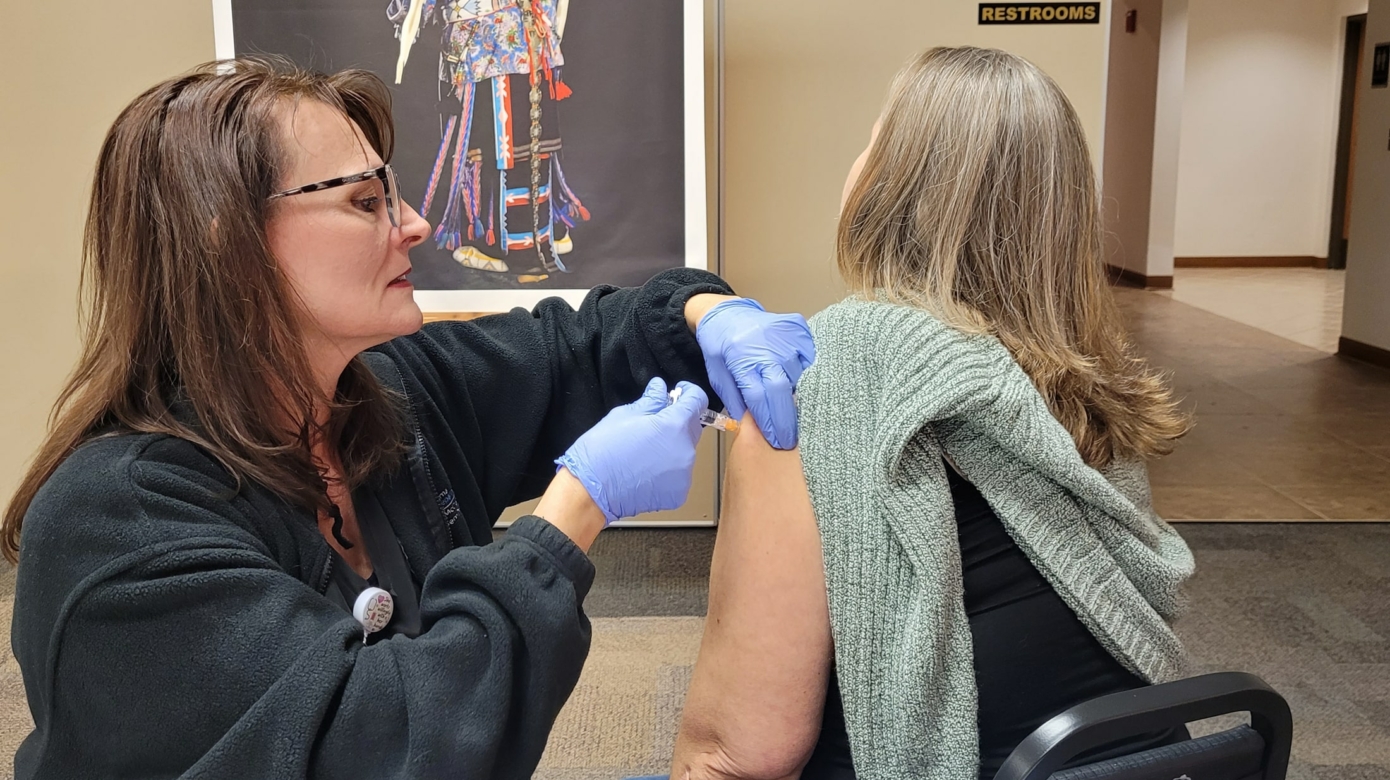Did you know that the word “vaccine” comes from the Latin word “vaca,” meaning “cow,” with “vaccinia” meaning “cowpox virus”? The word’s definition expanded after a doctor in England found success in the late 18th century using the cowpox virus to immunize community members from smallpox.
Kellie Clark, RN and Assistant District Nurse Manager for the Oklahoma State Department of Health, shared that piece of history at a vaccine education event hosted by the Pottawatomie County Health Department and Citizen Potawatomi Nation Health Services in late January.
Approximately 35 attendees gathered at the CPN Cultural Heritage Center to hear about the importance of vaccinations, both on an individual and community level. Emily Walsh works for the Pottawatomie County Health Department as its health equity specialist and organized the event.
“We are passionate about vaccines and just the health that comes with it, especially with the COVID vaccine. And so, we just really wanted to promote it with our community and our partners,” she said, adding that CPN is a great partner in public health.
“They just do so much and are so generous. And so anytime that we’re able to partner with CPN, we try to do that. And this seemed like a great opportunity.”
The evening included speakers, a resource booth, door prizes and a nurse from the Pottawatomie County Health Department administering vaccinations to those interested. CPNHS Licensed Practical Nurse Christine Vencl created a booth using small toys, cartoons and pamphlets that showed the lifecycle of a virus and how it spreads throughout the human body.
“I feel like everybody learns differently. Some people are visual learners. And (it’s important) to make education fun. There might be something that stands out to someone,” she said.
Vencl keeps that in mind while discussing vaccines with patients on a day-to-day basis. She feels it is important to meet them at their understanding level and works hard to answer every question.
“Whenever they understand it and realize (the benefits), then they’re open to saying, ‘Yes, I do need that,’ or ‘My child needs that.’ So, educating them and their ‘a-ha’ moments are just wonderful,” she said.
Dr. Lori Crow, MD, a pediatrician at SSM Health in Pottawatomie County, spoke about the importance of inoculating children on schedule. She described vaccines as a “part of starting a kid out on the right track for a healthy life” and “one of medicine’s greatest inventions.”
She discussed rotavirus, MMR (measles, mumps and rubella), whooping cough, polio, chickenpox, Hepatitis A and B, HPV, meningitis, flu, COVID and other diseases. Crow also reminded attendees that vaccines are the reason many people alive today have not encountered these diseases and that increased globalization makes them easier to spread.
Clark spoke next, focusing on the history of vaccines as well as adult inoculations in different stages of life — as a college student, while pregnant, as an elder, while traveling internationally and for those with preexisting conditions.
“I think a lot of the times people hear vaccines and they think babies and children, but it’s important throughout your life to maintain good health and to help prevent those diseases that you don’t have to get, if you get vaccines,” Walsh said.
Vencl’s presentation tied them all together with a brief demonstration on how measles spreads, one of the most contagious viruses known to man. She also played a short documentary video about two families affected by meningitis, one experiencing their son’s sudden death as a college student.
“Vaccine-preventable diseases do not discriminate,” Vencl said after the video. “Every parent, grandparent, aunt and uncle, family members and guardians all want to keep their precious babies, children and self well.”
The stories and new information made attendee Rebecca Frawley reconsider her family’s vaccinations. Even as a member of the clerical staff at the Pottawatomie County Health Department, she realized she needed to look again.
“I didn’t realize there was so much danger out there with meningitis. When we get to work tomorrow, I’m going to have them pull my shot record to see if I actually have my shots for the meningitis,” she said.
Vencl and the CPNHS staff check patients’ vaccination records at each appointment and ensure they remain up to date.
“If they have any questions or concerns, we can alleviate that before. We give them a vaccine information statement that tells them about the vaccine, and each patient, for every vaccine they get, gets that. That way when they get home, and their arm’s a little sore or they feel a little achy, they can refer back to that and know that it’s a normal response,” she said.
Following the presentations, a nurse from the Pottawatomie County Health Department vaccinated a handful of attendees. Jessica Cranmore works as a hostess at a popular restaurant, which means interacting with the public. She received her COVID booster as well as a flu shot and found the evening educational.
“Now I’m thinking about my (children) going, ‘Oh crap, I know they’re up to date on their records, their shots, but we need to look at that,’” Cranmore said. “If it’s avoidable by one little shot, then I mean, they only hurt for a minute.”
After the history, scientific explanations, demonstrations and answered questions, Walsh summed up the evening’s message in two words.
“Get vaccinated.”
Find out more about Citizen Potawatomi Nation Health Services at cpn.news/health.

